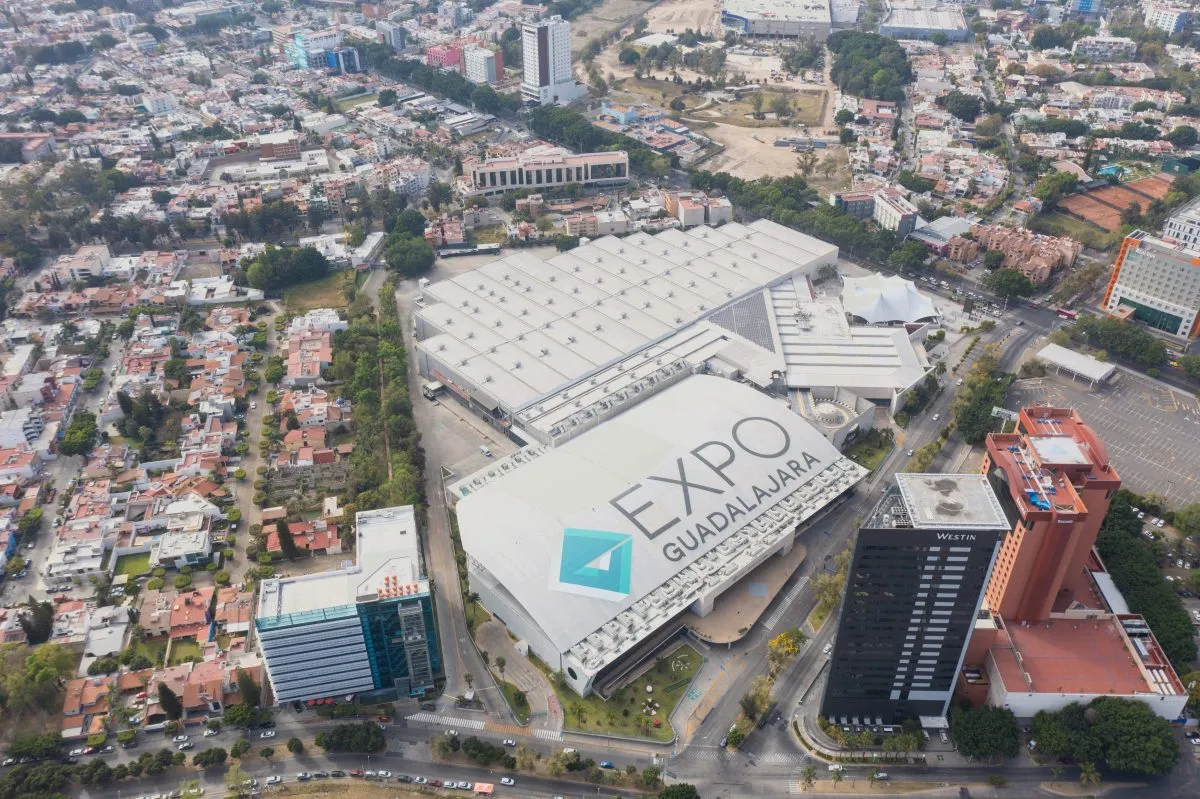Event Planning Certification Guide (2020 edition)

Skift Take
Many people are interested in a career organizing events but are unsure how to go about it. Today, there are record numbers of event management courses, certificates, certifications and degrees to choose from.
You don’t want to invest your time and money into the wrong choice for you but, I think you will agree when we say that the choices in qualifications to become an event planner, and the best route to take, can be baffling.
This is why we have created the ultimate event planning training guide, outlining all of the options to starting a career in the event industry.
After reading this post you will be better informed about the right choices to make to get your dream job as an event planner.
In this guide, we cover:
- Which Event Management Training and Qualifications Are Right for You?
- Event Industry Certifications
- Becoming a Certified Meeting Professional - CMP
- How to Pass the CMP (or any event certification) Exam
- Event Planning Certificates
- Is an Event Certificate Program Better for You?
- Event Association Education
- Colleges and Universities - Event Management Degrees
- Event Industry Scholarships
- Event Planning Books
Meeting, convention, and event planners are in demand. The Bureau of Labor Statistics and O*Net Online, a partner of American Job Center Network, states the projected growth for meeting, convention and event planners is expected to increase 11% in the USA between 2016-2026, faster than average.
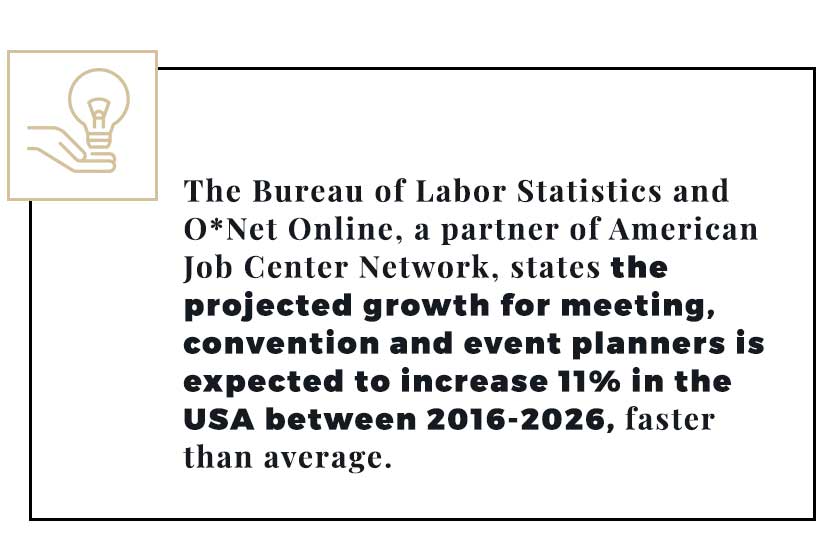
The two main things that will help you be successful in the event industry are hands-on experience and relevant industry education.
Professor Joe Goldblatt, Queen Margaret University, Edinburgh, Scotland and a pioneer in event education, says, “During the past 25 years, evidence of event management education and qualifications has rapidly developed from being a desirable to an essential requirement for entry level positions in this field. Therefore, the best businesses now only employ the best educated.”
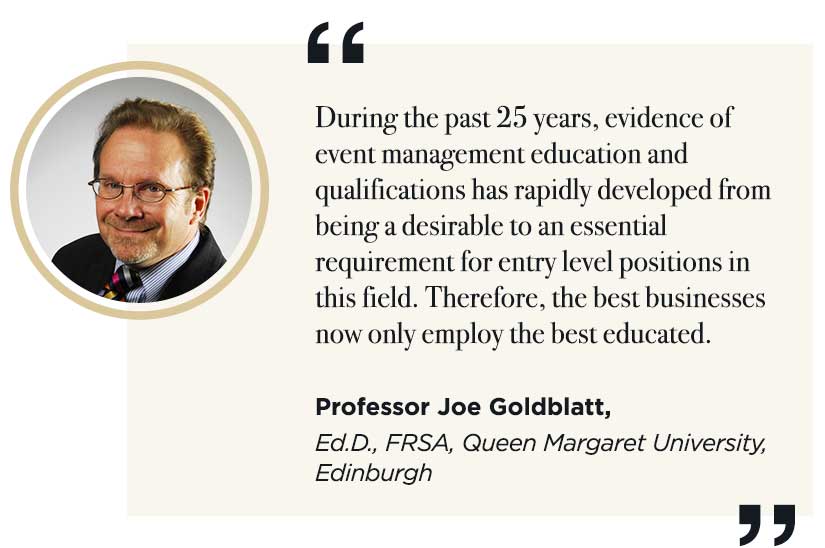
Research on Career Progression in Events
In our recent state of the event industry survey, education was not one of the top priorities for event planners. Only 35% stated that they needed more education to advance their career in 2019.
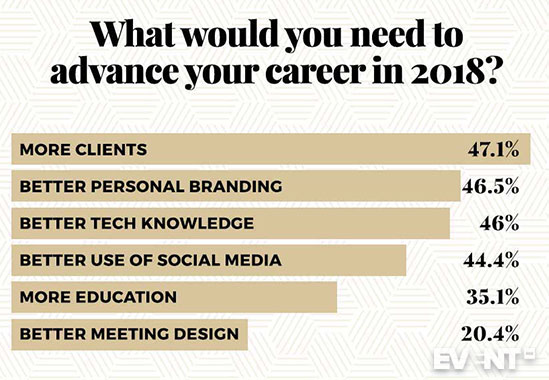
However revealingly, 28% were concerned with their lack of career progression. This was, in fact, their 4th biggest concern.
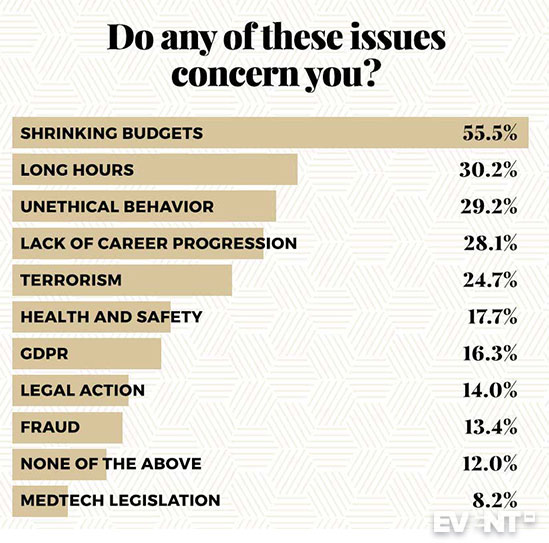
For these event managers, qualifications or further event planning training could be a wise move to fill in any gaps in their knowledge, to show their dedication and commitment to their career in events and open new doors for them.
If you would like a copy of this research for publishing you can request it here: State of the Event Industry Research 2018
Which Event Management Training and Qualifications Are Right for Me?
The event industry is constantly evolving. New and improved processes, software and technology require constant monitoring and upgrading of your skills.
The opportunities are there, but you must prepare and be ready for them when they arise. There are many options available but it can be difficult to decide what is best for you. The type and source of education you choose will vary depending on your budget, time and specific needs.
Do you want to be in classes with 30 to 60 other students who are novice to the industry, where the learning starts from ground zero, assuming no prior knowledge? Or do you have some experience already and want to focus on targeted areas of the industry where you may be weaker? Or maybe your college degree isn’t related to this field and you just need industry knowledge and education?
Some barriers to education include the amount of time available, the financial cost, self-doubt and location. Online education is beneficial for those that are place-bound, due to family, job, etc.
On many social media outlets, such as LinkedIn and Facebook, there are often posts from people wanting advice on how to get into the events industry. The answer is always education and experience. You can attend event planning training seminars to improve your knowledge. There are many valuable and free online resources - such as EventMB. Read online magazines, reports and attend event planning classes, such as online free webinars to enhance your skills. However, although valuable, they do not document your learning. There is no evidence to put on your resume.
There are three activities listed below that you can do to help determine the education you need.
-
Personal Gap Analysis
First, do a personal Gap Analysis. Look for gaps in your knowledge and experience. If you are currently employed in the industry and want to improve your skills and marketability, you can target areas that you do not currently deal with. For example, if you are employed by a large organization, where labor is divided, you may only deal with one area of a large convention, such as program planning. If you want to learn more about, say, the tradeshow area, you can take a targeted certificate program in exhibition management.
-
SWOT Analysis
Do a SWOT Analysis. Map out the Strengths, Weaknesses, Opportunities and Threats of each learning option. You can look at things such as cost, time involved, what credential you will earn, location, availability, convenience, quality, status, etc.
-
Know Your Learning Style
What kind of learner are you? Do you respond more to visual or audio presentations? Or perhaps a combination is preferable. Do you prefer hands-on learning? Do you need face-to-face interaction? In 1983 an American developmental psychologist Howard Gardener described 9 different types of intelligence:
- Naturalist (nature smart)
- Musical (sound smart)
- Logical-mathematical (number/reasoning smart)
- Existential (life smart)
- Interpersonal (people smart)
- Bodily-kinesthetic (body smart)
- Linguistic (word smart)
Focus on the areas of the industry where you can use your natural abilities, as well as the delivery style that would most suit your way of learning.
Event Industry Certifications
There is a lot of confusion out there between certification, awarded by associations, and certificate programs, offered by educational institutions. So, to clarify the differences, first, we will cover certifications. (Certificate programs will follow in the next section).
Certifications are peer-recognized credentials that demonstrate that you have both the knowledge and appropriate experience in your field. Professionals with certifications have demonstrated that they care about their profession and take it more seriously. They will usually be a more well-rounded individual.
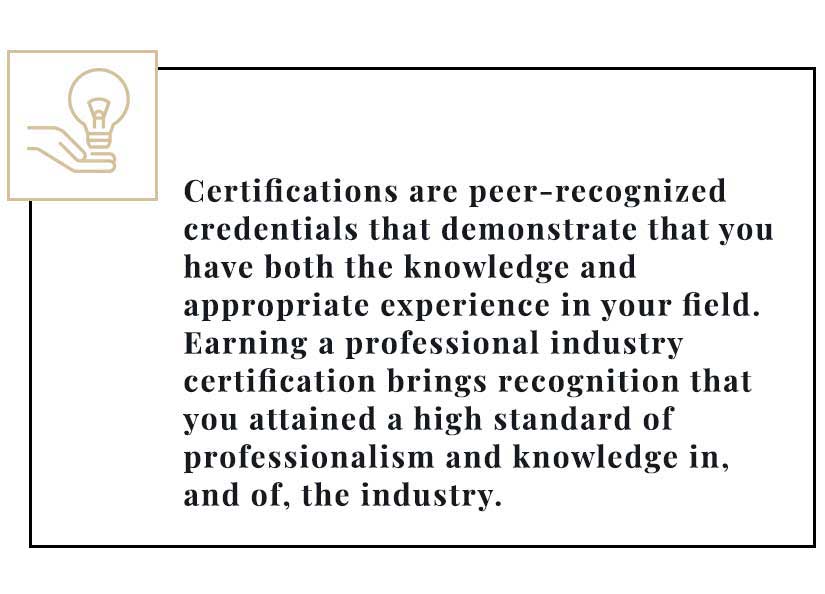
Earning a professional industry certification brings recognition that you attained a high standard of professionalism and knowledge in, and of, the industry.
Each month, there are a huge number of searches for accredited event planning courses, wedding and event planning certification, event planning certification online and event planning certification classes. People are searching for ways to study and better themselves, and often looking for more flexible options than a full time study course.
Certifications are usually awarded by an association after a member submits an application, meets the criteria set by the association and takes a comprehensive test. Criteria usually is based on a point system that can include things such as education in the field (documented by degrees, certificates, CEUs - Continuing Education Units, or continuing education credits), number of years in the industry, number of years as a member of the association, number of annual conferences attended, writing published articles or books about the industry, guest speaking to students, etc. Some require essays or projects. Some require attendance at a focused seminar/workshop. The tests are usually based on recommended books. Some certifications are for life, and others require recertification every 5 years or so. Beware of certifications that are awarded simply for attending conferences. They are marketing ploys to increase attendance and are not respected.
CEUs (Continuing Education Units), are awarded by an accrediting body, such as an educational institution or an industry association, to document your educational experience. One CEU is awarded for each 10 contact hours. (So, a 5-hour seminar would provide the attendee 0.5 CEU’s)
Once you achieve certification, you may add the acronym(s) following your name. For example, Patti Shock, CPCE. (Certified Professional in Catering and Events)
Many professionals have multiple certifications, with alphabet soup following their name.
How To Become a Certified Meeting Professional - CMP
The most recognizable certification in the meetings, events, and convention industry is the CMP: Certified Meeting Professional, administered by the Events Industry Council (EIC). This is the umbrella certification for the convention, meetings and event industry. (The EIC is a federation of 32 industry associations). The CMP covers all facets of the MICE industry. (Meetings, Incentives, Conventions & Events).
The CMP was launched in 1985 to enhance the knowledge and performance of meeting professionals, promote the status and credibility of the meeting profession, and advance uniform standards of practice. Study groups form around the world for those planning to take the test. More than 11,000 industry professionals hold this designation.
Before you can sit for the Events Industry Council’s CMP exam, you must have been working in the meeting profession for 36 months and have 25 hours of continuing education within the past five years. If your degree is in the field, such as hospitality or event management, you only need 24 months of experience. Additionally, industry internships may count towards your 25 hours of continuing education.
EventMB is a CMP Preferred Provider, accredited by the Events Industry Council, and provides Continuing Education (CE) credits for learning activities. CMPs can acquire CE credits through our reports, webinars and other reading material (see the resource list).
Pass the CMP Exam (or any event certification): Advice from Qualified CMPs
In order to ace the Certified Meeting Professional exam, or any event certification exam, you need to work on:
- Preparation work before sitting for it
- CMP test-taking tips for during the actual exam
CMP Prep Work Tips
- Take it Seriously
This isn’t the type of testing most of us can walk in cold and expect to pass. Some people assume industry exams are just a formality. But you will need to study.
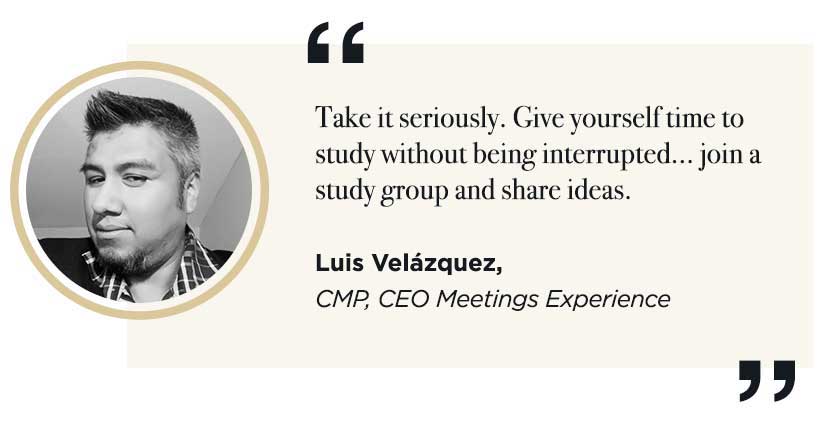
-
Use All the Resources Available
There are many study and support resources out there for event planners that are sitting for the CMP. Netti Fulton, CMP, from the Hampton Convention & Visitor Bureau, who took the exam in 2017 advises to: “Read the whole manual out loud; use the “Pocket Prep” CMP Exam prep application for your phone and pay for the upgrade; and attend a CMP Boot Camp sponsored by your local or nearby MPI Chapter.”
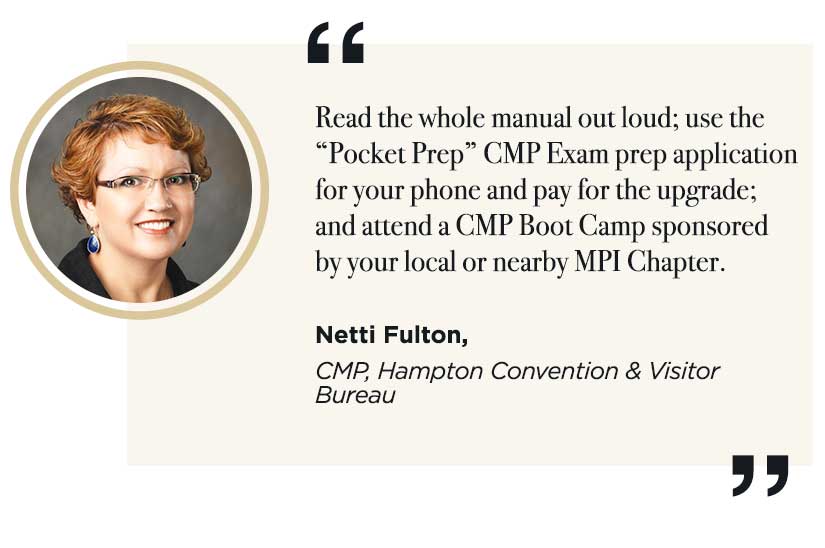
-
Find the Resource(s) That Works for the Way You Learn
We all learn and retain information differently. Some people are visual learners, others auditory. For Netti Fulton, CMP, reading the manual out loud as peers had suggested wasn’t enough. So she created her own study tool by recording herself reading the manual and then playing it back. Do what works for you and spend the time figuring out what that is.
-
Take a Course
There are many prep courses and programs designed to help you master the CMP. A good course will provide structure to the learning material and condense the information into manageable lessons that are easier to process.
-
See It for the Time Investment It Is
The CMP designation is an investment in your career and it is also a significant time investment. Recognize that going in, and set aside time in your schedule to prepare for it. Mary Anne Whittle, CMP, suggests: “Be committed to the process. Understand that this is a major undertaking and should be treated as such. Commitment to the process will go a long way towards a successful outcome on the exam and to your career.”
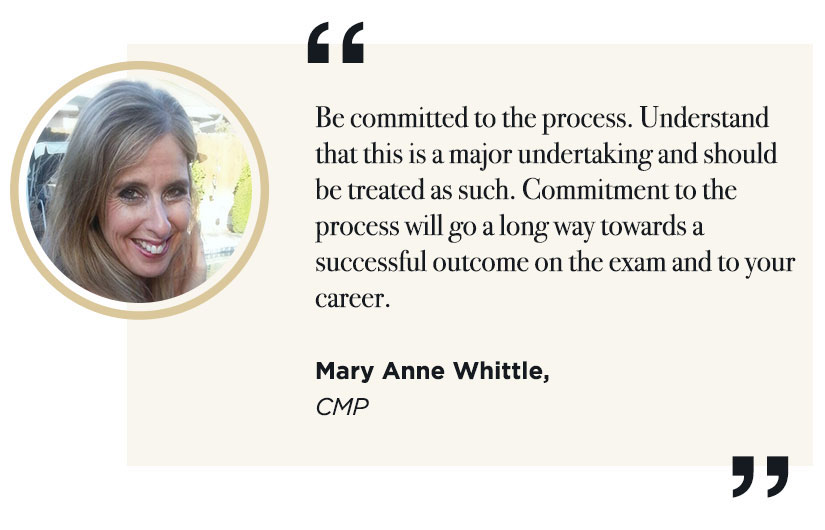
-
Join a Study Group
If you’re someone who learns best in groups and likes the idea of bouncing concepts off other event professionals, a study group can be a critical part of your preparation plan. Susan Daddio, CMP, Director of Global Events for the Waters Corporation found: “If you join a study group, have each member create a quiz each week (different chapters) so you can learn different styles of questioning. Don’t try to cram at the last minute for the exam. Start studying/preparing in advance of your first study group meeting.”
-
Ask Others Who Have Passed for Help
The CMP designation welcomes you into a successful group. It’s a tight-knit community that looks to give back. Qualified CMPs were once where you are now. If you have questions or need assistance, ask a current CMP. They’re happy to make suggestions and share their experiences (as you can see with the advice in this post).
-
Create Your Own Study Group
A study group may not be available in your area but that shouldn’t stop you or hold you back from the advantages of studying with a group if that’s a way in which you like to learn. You can create a private group page on Facebook for discussions and resources for your study group. Mary Jo Wiseman, CMP and Author of The Meeting Planning Guide: A Guide to Planning Successful Meetings says creating a study group can be: “…a great learning/leadership experience.” You can form an in-person group or one online.
-
Stay Involved Afterwards
This isn’t really a test-taking tip but it is important to understand prior to taking the test, the type of community you are entering and the unspoken expectations behind becoming a CMP. Vanessa Kane, CMP, CMM, Manager of Meetings & Events for the Veterans of Foreign Wars of the United States says: “I would encourage someone who gains their CMP to continue to be involved in committees, writing articles, participating in webinars and attending industry meetings that will enhance your career/growth.”
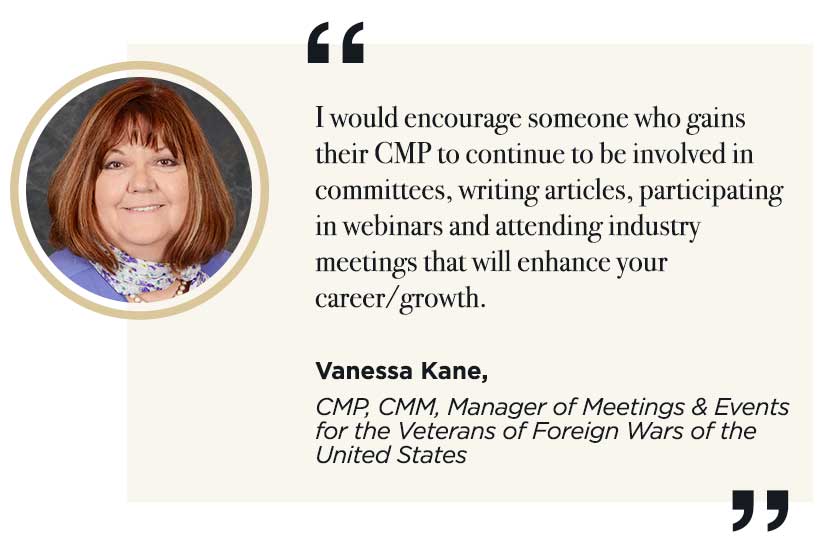
CMP Test-Taking Tips
- Go in well rested. No need to add fatigue to the mix. The questions are challenging enough.
- Understand all the instructions given by the test-taking facility and follow them, advises Mary Anne Whittle. She also suggests that you should: “Thoughtfully read the full question, and then read it again. Don’t skim or you may misunderstand what you are being asked and answer incorrectly.” Archana Pyatt, CMP and CPCE, offers: “…it makes a real difference on how the question is worded, even if you know the information.”
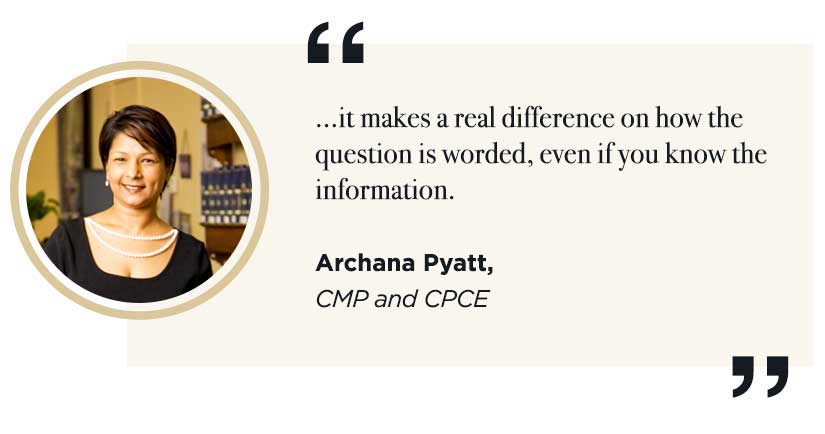
- Answer everything you know for certain first. Don’t waste your time in the beginning on questions you’re unsure of.
- Next, circle back to those things you weren’t confident on. Since you’ve already answered all the ‘easy’ ones, you can spend the rest of your three-hour time on the harder questions.
- If you can narrow something down and eliminate some options, you can make a more educated guess and have a higher possibility of getting it right.
- Know the exam is written for textbook answers or industry practice guidelines (that’s why studying is critical to your success), not always what you would do in real life, offers Senior Meeting and Event Planner, Angela Skeen, CMP, CMM.
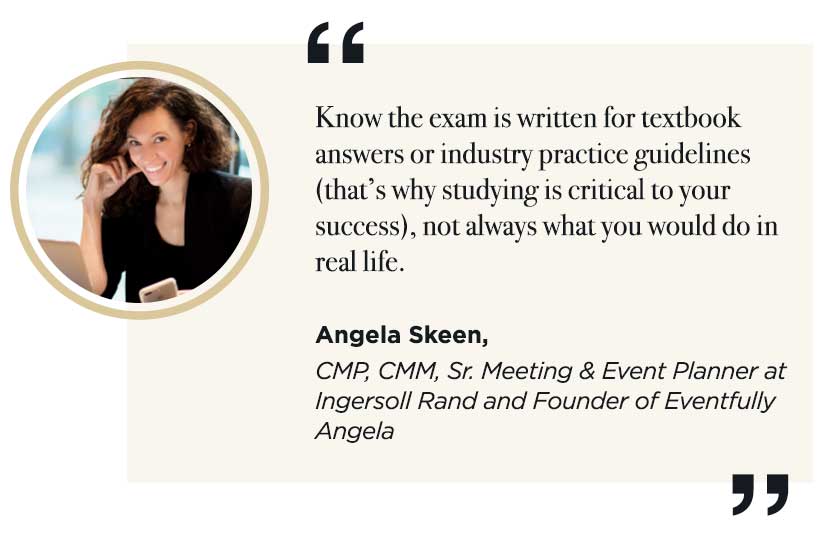
- Depending on where you are taking your exam, you could be sitting for your CMP with others who are taking different exams of varying lengths in other professions. Don’t get distracted by people finishing at different times. Concentrate on what you’re doing. Some certification tests are available online, and the results are immediate. If the test is proctored and the proctor must mail the completed tests to headquarters to have them graded by hand, it may be several weeks until the results are known.
6 Things People Don’t Tell You About Passing Your CMP
There’s a lot of time and money that goes into sitting for your CMP exam. No matter how prepared you are, there are always those secrets you wish someone had shared. Here are some we’ve gathered from CMPs:
- “I would have liked to have more experience, to have done more events previously to be able to understand the magnitude of the CMP,” shares Luis Velázquez, CMP.
- While experience prepares you, there are aspects of test-taking that you need to familiarize yourself with. Don’t assume years of experience negate your need to study or prep for this sort of exam.
- You may be surprised by the math component. Ask if calculators are allowed.
- The amount of time suggested to prepare for the test might actually take you two to three times that. Plan accordingly.
- “Even if you don’t plan to take the exam for a couple of years, create your CMP account with EIC online now so you can begin tracking your CEUs. It will save you time and headache in the application process” suggests Jeannie Power CMP, DES, Power Event Group.
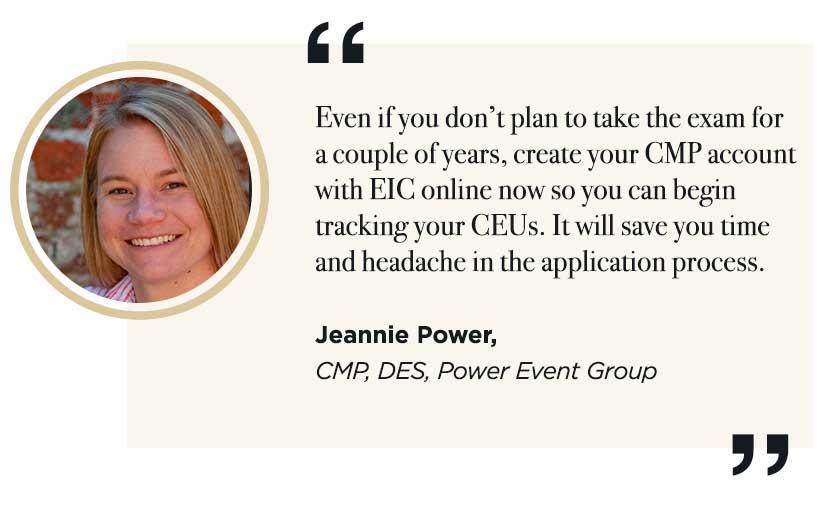
- “Recertification time comes around quickly. With the digital ability of tracking, it’s no longer such a necessity to ‘keep a file’ of all that you have accomplished or that would contribute to recertification,” adds Vanessa Kane, CMP, CMM.
Is Becoming a Certified Meeting Professional (CMP) Worthwhile?
A CMP is a time-consuming undertaking, but research suggests it is worth the return on your investment. In the 2016 Professional Convention Management Association’s annual salary report, which draws its numbers from 400 association, corporate, and independent meeting professional respondents, those with a CMP after their names earned on average $8,500 more than those without the designation.
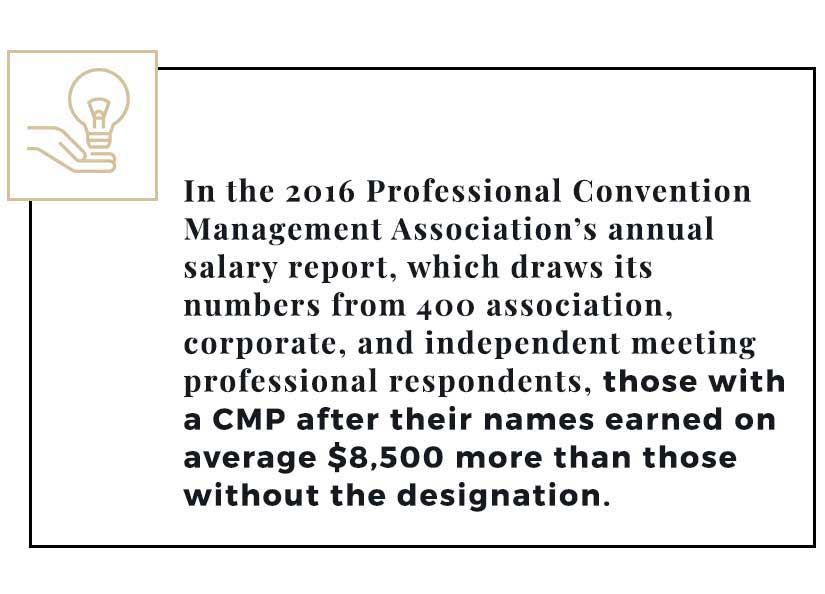
Achieving the CMP designation is something to be proud of. You join an elite group of meeting planners to have accomplished this. To get there you need to put forth the hard work and dedication no matter how long you’ve been in the industry. This means hours of studying but hopefully, these tips from those who have been there will make it easier.
The EIC also offers the SEP – Sustainable Event Professional, for those that take the offered class.
Other Event Industry Certifications
Certification can help set you apart from other professionals in your field as someone who is dedicated to ongoing learning and professionalism in our industry. It shows a person who is committed to our industry and the dedication to stay up to date with relevant information.
Many member EIC associations offer separate, targeted certifications that are more focused on their particular industry niche.
Some additional examples of industry certifications include:
CAE: Certified Association Executive, from the American Society for Association Executives (ASAE).
CDHM: Certified Hospitality Digital Marketer;
CHBA: Certified in Hospitality Business Acumen; and,
CRME: Certified Revenue Management Executive,
all from the Hotel Sales and Marketing Association International (HSMAI)
CEM: Certified in Exposition Management, from the International Association of Exhibitions & Events (IAEE). The designation is obtained by the completion of nine courses, which are offered in classroom and online. The CEM learning program is offered in the United States, Canada, Brazil, China, Dubai, Korea, Mexico, Portugal, Singapore, Spain, Taiwan and Thailand.
CFE: Certified Facilities Executive and
CVP: Certified Venue Professional,
from the International Association of Venue Managers (IAVM)
CPCE: Certified Professional in Catering & Events, from the National Association for Catering & Events (NACE)
CMM: Certification in Meeting Management, from Meeting Professionals International (MPI)
CSEP: Certified Special Events Professional, from the International Live Events Association (ILEA)
CGMP: Certified Government Meeting Professional, from the Society of Government Meeting Professionals (SGMP)
CED: Certified Event Designer. The Event Design Certificate Program is recognised by the Events Industry Council and MPI.
DMCP: Destination Management Certified Professional and
ADMC: Accredited Destination Management Company,
from the Association of Destination Management Executives (ADME)
GLP: Global Leadership Professional, from the Global Business Travel Association (GBTA)
The American Hotel & Lodging Educational Institute (AHLEI) has a plethora of certifications available, including the CRDE (Certified Rooms Division Executive), CFBE (Certified Food and Beverage Executive), CHT (Certified Hospitality Trainer), CGSP (Certified Guest Service Professional) and the CHSP (Certified Hospitality Sales Professional).
Case Study: The Venetian, Las Vegas
The Venetian, in Las Vegas, has a goal to have all of their catering and convention service staff holding industry certifications. I proctored the CPCE certification exam for about 20 of them a couple of years ago. They don’t require certification to be hired, but they place everyone on a tailored path to help them achieve both the CPCE and the CMP. Right now, 70 percent of their managers have the CMP and 79 percent hold the CPCE. Gary McCreary, CMP, CPCE, CSEP. Vice President of Catering & Convention Operations says that some are not qualified yet to sit for the exam, but by the end of 2019 they should be at 100% for both certifications. He further stated, “I think the most important pursuit anyone can do in their Professional Career is to continue to refine their craft through education and the process and study required for both these certificates contributes to that end.”
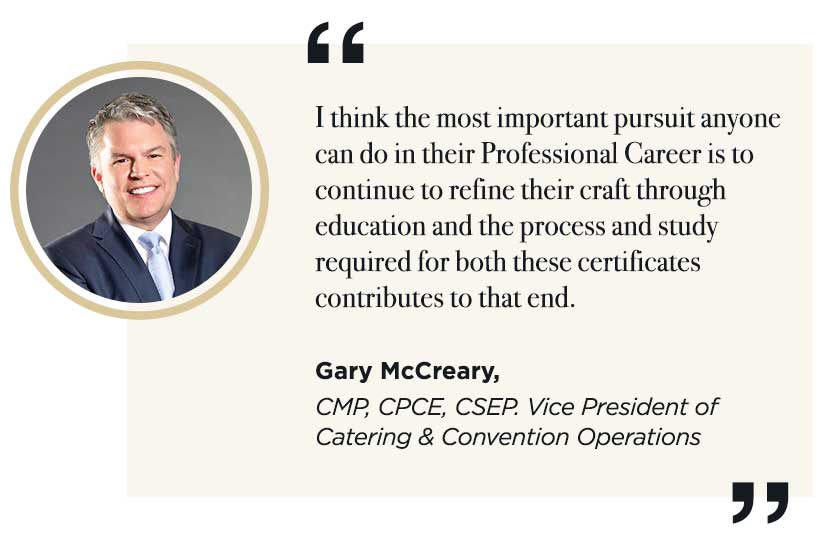
Is an Event Certificate Program Right for You?
Targeted certificate programs provide specialized education that is directly related to the unique niches in our industry, without having to take a lot of core classes on topics you have no interest in.
Many experienced professionals enroll in certificate programs. Some reasons include the fact that they worked their way up in the industry, and have the experience, but they want that ‘piece of paper’ for their resume. Also, many people with Bachelor’s degrees did not major in hospitality or events, so while they have a degree, which can indicate that they are intelligent, they have no relevant education for our industry. Also, when you are self-taught or learn on the job, there are gaps in your knowledge. Particularly, if you work for a large company where the jobs are more segmented. Education fills the gaps.
Vetting the Options Available: Event Certificates
You need to do your homework and vet the different options, because not all certificate programs are equal. If you are looking to enroll in a certificate program or hire a graduate of a certificate program, you need to look at things like:
- The experience and educational backgrounds of the faculty
- The types of assignments that are required
- Are online students assigned an instructor that is available for any questions, mentoring, etc.?
- The testing requirements
- The learning competencies indicated
- The learning objectives clearly stated
- The strength of their industry connections
These are some questions to ask when vetting a certificate program:
In-Person Certificate Classes
Instructors: What are their degrees or certifications? Do instructors have relevant industry experience? How recent is their experience and are they currently working in the industry? The industry is evolving quickly. Instructors must keep up. For example, marketing from 10 years ago is a whole new ballgame, with the advent of social media. Do they know how to teach? There is an old adage that those that can, ‘do’ and those that can’t ‘teach’. But, in my experience, just because you can ‘do’ doesn’t mean you can teach. The American Hotel & Lodging Educational Institute (AHLEI) offers the CHE (Certified Hospitality Educator) and the CHT (Certified Hospitality Trainer.) These programs teach one how to organize material, how to write learning objectives, how to develop competency-based assignments and tests.
Length of time to complete the program: How many in-class contact hours? A weekend? Several weekends? A week? Five weeks? Three months?
Rigor: Is there testing? Are there required assignments? (Ask for examples of assignments). Do students complete portfolios and give presentations? If it looks too easy to achieve, or offers a ‘certification’ with it, look elsewhere.
Class sizes: How many students are typically in a class?
Placement rate: What percentage of graduates find employment in the field within a year? What kind of assistance to they provide?
Completion rate: What percentage of students that start complete the certificate program?
Cost: Is financing available?
Housing assistance: If you are traveling there, do they provide assistance in finding reasonably priced housing?
Accreditation: Do they hold any accreditations or licenses? Are they in the accreditation process? Are they partners with any industry associations?
Extras: Are there guest lecturers? Are there field trips? Are there opportunities to network with industry professionals? Is there an alumni association?
Learning Management Systems (LMS): Do they use an online platform, such as Blackboard, Brightspace, or Canvas? These systems automate test taking, allow for assignment submission, discussions and communication with the instructor. These systems are used for both on-campus and online classes.
Online Certificate Programs
I am a great proponent of online education – if properly designed. In addition to classroom teaching, I have been teaching online for over 20 years. Many people are place-bound – they cannot travel due to work requirements, family commitments or cost. Online education has come a long way in recent years. The last thing you want is a program that is set up like the old correspondence courses. Today, PowerPoints can be narrated, videos can be made or found on YouTube, and links can be provided to online resources, such as relevant articles or webinars on-demand. Skype can be used for meetings and presentations.
But, online education requires motivated learners. You must be self-directed to keep up with the readings, presentations, assignments and tests in a timely manner, meeting the deadlines.
Notable certificate programs available include:
- George Washington University (GWU) Washington, DC or Online. In-person classes are offered as a week-long institute four times per year. Or one and two day sessions for electives, including Corporate Event Management, Event Fundraising & Sponsorship, Budgeting for Event Planners, Making the Most of Social Media, Protocol for Event Managers and Event Entertainment & Production. CEUs awarded.
- The International School of Hospitality (TISOH), Las Vegas, NV or Online. Las Vegas campus: Three-month program that meets two nights per week or an intensive a five-week Fast Track program that meets five mornings a week. Online: Three-month program. They also offer specialized programs in Event Design & Production, Meeting & Event Catering, Wedding Coordination & Design, Hospitality Human Resources and more. (Disclaimer: I am the academic consultant for The International School of Hospitality and I teach their online Conference Management & Event Planning (CMEP) certificate program).
- University of Georgia - Continuing Education. Classroom only. Four-day program includes Event Sourcing and Site Selection, Strategic Communication and Food and Beverage, Budgeting, Marketing, Special Events, Technology and Audio Visual, Contracts and Risk Management and Professional Development.
- University of North Carolina-Charlotte – Continuing Education. This certificate program provides those in the meetings industry and those who are interested in a new profession with education to advance their knowledge and abilities. Run twice a year at the Charlotte campus of the University of North Carolina/Charlotte, it draws participants from throughout the country who commit to six weekends during the course duration. Instructors include Joan Eisenstodt, an EIC Hall of Leaders Inductee, among others well known in the meetings and events industry.
If you take the time to investigate, you will find the perfect certificate program for you.
Event Association Education
Most of our industry associations offer educational programming. Many associations also have a 501c3 foundation, which supports the mission of the association. Many foundations offer scholarships, which are listed later in this guide.
You can attend monthly meetings, which usually contains a speaker or educational component. Many associations have state and/or regional meetings with education as a priority. And, the national conferences provide cutting-edge education.
CEIR: the Center for Exhibition Industry Research disseminates the results of research on all facets of the meetings and events industry.
EIC: Events Industry Council (formerly the CIC, Convention Industry Council) is a federation of 32 industry associations. They do not have individual members. If you belong to one of the member associations, you are represented by the EIC.
- APEX – Accepted Practices Exchange. An initiative that promotes standardization of forms and procedures to create and enhance efficiency. Included are templates for RFPs, managing bandwidth consumption, room block management and many others. They also house the online APEX glossary, which defines industry terminology.
- GMIC – Green Meetings Industry Council – provides information and webinars on sustainability.
ESA: Event Safety Alliance promotes ‘life safety first’ at events and has excellent information you should read prior to creating or updating a risk management plan. They also report on event disasters from around the world.
IAEE: International Association of Exhibitions and Events has an online career center, with many resources.
IAVM: International Association for Venue Managers offers the Venue Management School, a four-day annual conference.
MPI: Meeting Professionals International has the MPI Academy as well as a number of certificates available. These are short-term, intensive classes.
NACE: National Association for Catering & Events
PCMA: Professional Convention Management Association
UFI: The Global Association of the Exhibition Industry. based in Europe and offers a variety of exhibition education, including classes, and webinars. They have members in 85 countries.
Colleges and Universities - Event Management Degrees
Academic Education - USA
Academic colleges and universities grant degrees, such as Bachelors degrees, Masters degrees and the Ph.D. Colleges can be public or private and typically focus on one field of study, such as Liberal Arts. Universities are a collection of diverse colleges, such as Business, Liberal Arts, Fine Arts, Engineering, Hospitality, etc. Some colleges and universities are considered teaching universities. Teaching universities typically do not offer advanced degrees, such as the Masters or the Ph.D., and the peer-reviewed publication requirement is not as rigorous as it is at a research university.
Colleges typically have departments. A Business College would have a Marketing Department, a Management Department, an Economics Department, etc.
In my 35 years in higher education, I served as a department chair for 28 of those years, at two universities.
Students often have to take classes they do not want or need. The university core (classes that everyone must take), is decided by a campus-wide committee, each with their own special interests. All students must take the core, regardless of their major. Departments with ‘service courses’ (English, Math, History, Humanities, etc.) teach students from all majors. I never understood why a student from Singapore had to take a class in Nevada history.
A College is a stand-alone entity, which can be separate or part of a university, which is a collection of colleges – such as a Business College, a Liberal Arts College, an Engineering College, a Hospitality College, etc.
There are two-year colleges, four-year colleges, and graduate colleges.
Two-year colleges offer Associate Degrees. Typically an Associate of Arts or an Associate of Science.
Four-year colleges offer Bachelor Degrees, which are typically called ‘undergraduate’ degrees. Bachelor of Science degrees offer more specialized education in a student’s major. Bachelor of Arts degrees are more broad and theoretical. Bachelor of Science degrees are more focused and analytical.
Graduate Colleges (typically attached to a four-year college program) offer Masters and Doctorate Degrees and include a Master of Arts or a Master of Science. Doctoral programs offer the Ph.D. – Doctor of Philosophy as well as other doctoral designations such as the Ed. D., - Doctor of Education.
Classes are numbered according to their grade level. Freshman classes are 100 level, sophomore classes are 200 level, junior classes are 300 and senior classes are 400 level. Graduate classes are 600 level and above.
Most event and meeting programs are located in Hospitality colleges or departments. You can use this list of American Institutions of Higher Education to find a Hospitality program in your area. If there is no convenient alternative for you, consider online education, which you can access from anywhere. I teach online for several colleges – from Las Vegas.
But, Hospitality programs are not always easy to find. In a few universities, they are stand-alone colleges. In some universities, they could be a department in the Business College or what was once called Home Economics but currently have a variety of names, including Consumer Science. In some colleges, they are housed with the dietetics programs, as they share the food classes. And, to make it even more confusing, there are a variety of names, including Hospitality, Hotel Management, Tourism, Culinary, etc.
Once you select the ideal college, the next step is to contact the chair of the department or the college advising office. Typically you can take up to 12 credits as a non-admitted student without enrolling for a degree. College classes are typically three credit hours each. Be sure not to go over 12 credit hours, if you intend to use your classes toward an eventual degree, as most colleges will not accept more than 12 credits toward a degree if you are not officially enrolled. Double check with the college for their specific regulations. Most colleges have their catalogs available online.
Don’t be afraid to discuss the following with the department chair or advising counselor:
- What is the typical class size? If you are in a class with 60 other students, you can’t expect a high level of personal attention.
- I strongly suggest that you request a copy of the class syllabus. Check the attendance policy if you travel frequently for your job.
- See if the college website has faculty bios. You want to know what qualifies the instructor to teach the class – what is their background in this segment of the industry? You want to be sure you are being taught by someone that knows more than you do. Do they have any industry experience? In what capacity? How long has it been since they worked in the industry? Check their social media sites to see if they are up on the latest innovations in technology?
A potential advantage of college classes is that you can apply them to a degree, if you continue to take the required classes. If you already have a degree in another field, you already have the core classes. All you would need would be to take the major classes to earn a second Bachelors degree.
You should check to see if there are any prerequisite classes required. A 300 level class may have a 100 level Intro to the Industry class required prior to taking the advanced class. Usually, the instructor has the power to waive the requirement, if you demonstrate existing knowledge or industry experience.
Auditing Classes
While you can usually audit classes, which means you get a seat, but you are not required to do any assignments or take any tests. However, the tuition is the same and there is no grade or documentation that you participated.
CLEPing Classes
College Level Examination Program (CLEP) is getting credit for what you already know by testing out of courses. Credit by exam options vary at different colleges. Some colleges only allow CLEP credit as electives and not for required courses in the major. Most colleges limit the number of courses you can test out of. Check the online catalog of the school(s) you are considering
Tuition
Tuition is charged by the credit hour. Most classes are three (3) credit hours. Also, be aware of any student fees. There are often additional fees for technology, library fees, athletic fees, funding for student government, etc. Also, consider transportation and parking costs involved for on-campus classes.
Continuing (non-credit) Education from US Colleges
Most US colleges and universities have Continuing Education or Professional Development units. They offer non-academic CEU credit courses and certificates, not degrees.
Notable US College Event/Meeting Programs:
- Florida International University - Miami
- University of Nevada, Las Vegas
- University of Central Florida – Orlando
- Iowa State University
- Kennesaw State University – Atlanta area
- Indiana University – Purdue University at Indianapolis
- University of South Carolina – Columbia
- Metropolitan State University – Denver
- Georgia State University - Atlanta
- San Jose State University - California
- Madison Area Technical College – Wisconsin
- East Carolina University
- San Francisco State University
Academic Education - UK
20 years ago there was one university offering a degree in event management in the UK. Today there are 240 degrees and institutions to choose from listing events as their core focus. If you include hospitality focused courses this number will be significantly higher.
The entry criteria and the specialisms vary, as does the importance and weighting given to work experience. For some degree courses, students must undertake a work placement or sandwich year to gain real-life experience running events, before progressing to the rest of the course. These courses are often four years long, instead of three years, in duration.
Notable UK University Event Management Degree Courses
There are a huge number of UK universities that offer event management training. To name just a few:
- Leeds Beckett (formerly Leeds Metropolitan University), Leeds, England
- Queen Margaret Mary University, Edinburgh, Scotland
- University of Greenwich, London, England
- Manchester Metropolitan University, Manchester, England
- UCLAN (University of Central Lancashire), Preston, England
Other International Colleges for Events
Top event planning schools internationally include:
- Hong Kong Polytechnic University
- Griffith University, Queensland, Australia
- LaTrobe University, Victoria, Australia
Additional schools can be found through the Council on Hotel, Restaurant and Institutional Education (CHRIE).
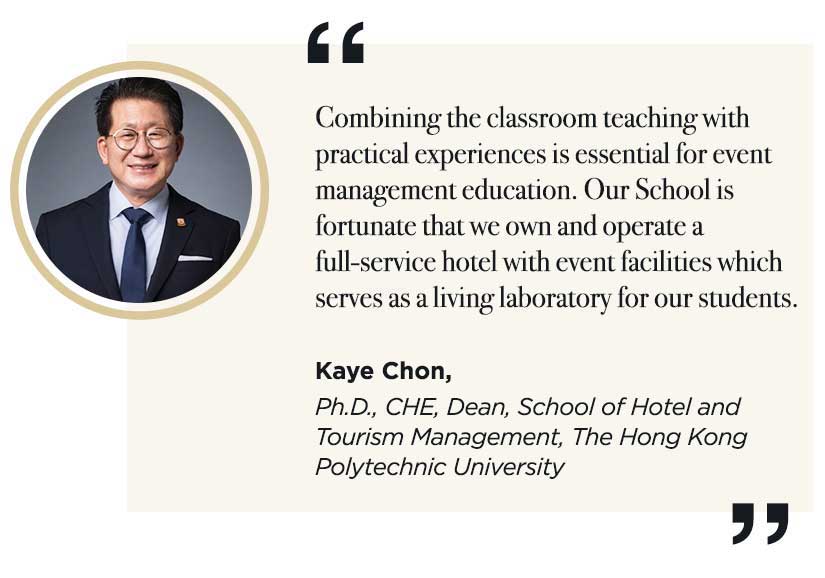
Event Industry Scholarships
Some scholarships are only for college students. Others include industry professionals and can be available for attending seminars and conferences, funding certification costs or for specific educational programs.
ADMEI has the Linda Thompson Memorial Scholarship for individuals preparing for a career in destination management. Two scholarships are available: one to a North American student and one to a global student.
The IAVM foundation offers the Joseph A. Floreano Scholarship and Internship Program to members.
The NACE Foundations has several scholarships awarded annually.
- Vince DeFinis Scholarship offers support for undergraduate students and/or members in the hospitality industry who demonstrate leadership
- The Foundation of NACE scholarship is designed to offer support to student members and members in the hospitality industry who demonstrate leadership abilities.
- The Richard Suttman CPCE scholarship was established to support NACE members interested in pursuing certification as a Certified Professional in Catering & Events (CPCE)
- The Patti J. Shock Scholarship, in conjunction with The International School of Hospitality (TISOH) and the Foundation of NACE offer funding for the Meeting and Events Catering Certificate Program in-class or online offered by TISOH.
The Timothy SY Lam Foundation offers scholarships and grants for industry professionals. Their mission is to support research, education and training within the hospitality industry by bestowing grants and scholarships to those seeking careers or career advancement within the hospitality industry. You can apply to fund your certification, continuing education or conference travel.
ESPA – Event Service Professionals Association
- William H. Just, CAE, CMP Memorial Award – available to recent (within 5 years) CMP designates.
- Donald S. Freeman Jr. ESPA Conference Scholarship – for students to attend the ESPA Conference
ESA - Event Safety Alliance offers the Event Safety Summit Scholarship, which provides free registration to their conference. Recipients are responsible for their own travel and lodging costs.
IACC – International Association of Conference Centers
- Grants scholarships to deserving students in hospitality programs globally. They provide student scholarships, student participation at conferences and events
- They sponsor a global internship program.
IAEE provides the following:
- Bob Dallmeyer Education Fund recognizes deserving individuals by providing funding for them to further their professional growth. There is no stated amount that can be requested or granted.
- Global exchange experiences: Funding to attend a program related to the exhibition industry outside of their home country.
- Funding for speakers at industry meetings
- CEM funding
- Helen Brett Scholarship – awarded to individuals who are studying exhibition management to advance their careers.
PCMA Foundation:
-
- Convening Leaders Global Scholarships and Student and Faculty Scholarships which include registration, 4 room nights and airfare up to $1000 to attend Convening Leaders
- Medical Business Event Professional Scholarships
- Digital Experience Scholarship (DES) for live 7-week online course
- Roy B. Evans Global Student Scholarships – tuition-based scholarship of $7500 for up to two PCMA student members
- Global Student Scholarship - up to $2500 for one PCMA student member who is not a citizen or permanent resident of North America
Event Planning Books (all available on Amazon.com)
If you want to study up on your own or check out if it is a subject area you would like to gain more qualifications in, we have listed some textbooks and recommended reading. There are many excellent books available in print or as e-books. Here are a few I recommend:
- Convention Industry Council Manual, 9th Edition from the EIC
- A Meeting Planner’s Guide to Catered Events by Patti Shock and John Stefanelli
- Planning and Management of Meetings, Expositions, Events and Conventions by George Fenich
- Special Events: The Roots and Wings of Celebration by Joe Goldblatt
- Art of the Event: Complete Guide to Designing and Decorating Special Events by James Monroe
- Catering and Convention Service Survival Guide by Lisa Lynn Backus and Patti Shock
- Risk Management for Meetings and Events by Julia Rutherford Silvers
- Professional Event Coordination by Julia Rutherford Silvers
- Professional Meeting Management from PCMA
- The Art of the Show, from IAEE
IN CONCLUSION
A career as an event planner can be very rewarding. We hope this guide to event planning training has been useful and helped you to determine the best option for you.
Of course, learning does not stop when you graduate. That is just the beginning. Education prepares you for life, but you have to go out there and live it. You can’t be the best you can be if you don’t know where you are going. Being a lifelong learner means that you are more likely to reach the top and be successful.
Education is something that can never be taken away from you. It is an investment in your future. It also gives you a sense of pride and accomplishment to complete an educational goal.
Comedian Milton Berle once said, “If opportunity doesn’t knock, build a door.” Education is the key to open that door.
Now onto you:
-
- Do you want something to be added to make this page better? Is your institution not listed? Send an email to meetings@skift.com.
- Do you have more tips and advice to add? Comment below.
- Do you have a colleague who may benefit from reading this page? Share it with them.

